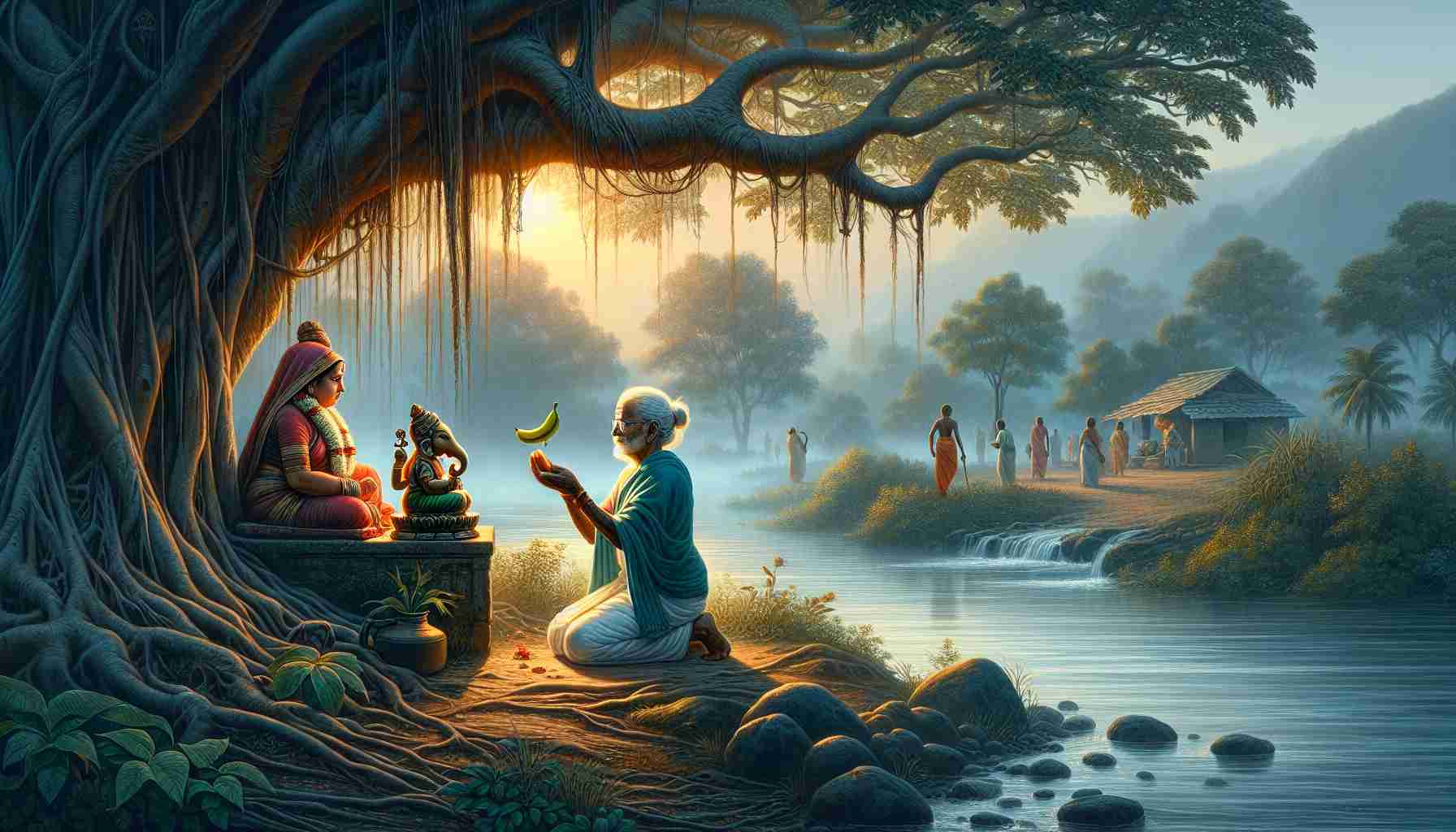

I am Meenakshi, a widow from Kumbakonam, near the banks of the Cauvery River. My life has been full of quiet routines and quiet grief. Since Arun, my husband, passed three years ago, I’ve kept my world small — caring for my in-laws, feeding the cows, and trying not to think about how heavy everything feels.
That morning, I broke down while sweeping the courtyard. I don’t know why it was that day. The broom slipped from my hand, my knees buckled, and I sat in the middle of the wet stone floor, sobbing quietly before anyone else in the house woke up.
I remember whispering, “How long do I have to carry all this? This loneliness… this endless work…”
Later, after chores, I walked to the temple near the old banyan tree — the one where they say Sri Rama once passed through during his forest exile. I wasn’t seeking answers; I just needed to sit. There, an old woman was tying little turmeric bundles to the tree bark. She carried herself like someone without burdens, though she was bent with age.
As I sat beneath the tree’s shade, I noticed something unusual. A little boy — maybe six or seven — stepped forward with folded hands and offered a small banana to the stone murti of Ganesha, the god who removes obstacles. Without saying a word, he turned and left, skipping back to his mother.
Something cracked open in me. Not loudly. Just a quiet shift.
That child didn’t ask Ganesha for anything. He just gave. And left smiling.
Later that night, when I lay by the kitchen window, the wind stirred the chimes my husband had hung years ago. Soft notes drifted into the room.
My mind, strangely clear, remembered a verse from the Bhagavad Gita. I didn’t even know I had memorized it.
“Karmaṇy-evādhikāras te mā phaleṣhu kadāchana”
You have a right to your actions, but not to the fruits of those actions.
— Bhagavad Gita 2.47
I realized something then. I always thought Karma was what came to me. But in that moment, I saw it differently — Karma was also the river carrying me when I had no strength to walk.
The duties I did daily — they weren’t unnoticed. They weren’t pointless. Each act, however heavy, was part of my soul’s journey, and unseen hands were lifting parts of my burden I didn’t even realize.
In the Upanishads, it is said: “As a man acts, so does he become.” (Brihadaranyaka Upanishad 4.4.5) Even when life wears us down, it is shaping us gently, like the river shapes the stone.
Now, when I feel the weight return, I return to the banyan tree. I don’t ask why anymore.
Instead, I bring a banana and place it gently before Ganesha — not begging, not bargaining — just offering.
And with each offering, I feel a little lighter.
I am Meenakshi, a widow from Kumbakonam, near the banks of the Cauvery River. My life has been full of quiet routines and quiet grief. Since Arun, my husband, passed three years ago, I’ve kept my world small — caring for my in-laws, feeding the cows, and trying not to think about how heavy everything feels.
That morning, I broke down while sweeping the courtyard. I don’t know why it was that day. The broom slipped from my hand, my knees buckled, and I sat in the middle of the wet stone floor, sobbing quietly before anyone else in the house woke up.
I remember whispering, “How long do I have to carry all this? This loneliness… this endless work…”
Later, after chores, I walked to the temple near the old banyan tree — the one where they say Sri Rama once passed through during his forest exile. I wasn’t seeking answers; I just needed to sit. There, an old woman was tying little turmeric bundles to the tree bark. She carried herself like someone without burdens, though she was bent with age.
As I sat beneath the tree’s shade, I noticed something unusual. A little boy — maybe six or seven — stepped forward with folded hands and offered a small banana to the stone murti of Ganesha, the god who removes obstacles. Without saying a word, he turned and left, skipping back to his mother.
Something cracked open in me. Not loudly. Just a quiet shift.
That child didn’t ask Ganesha for anything. He just gave. And left smiling.
Later that night, when I lay by the kitchen window, the wind stirred the chimes my husband had hung years ago. Soft notes drifted into the room.
My mind, strangely clear, remembered a verse from the Bhagavad Gita. I didn’t even know I had memorized it.
“Karmaṇy-evādhikāras te mā phaleṣhu kadāchana”
You have a right to your actions, but not to the fruits of those actions.
— Bhagavad Gita 2.47
I realized something then. I always thought Karma was what came to me. But in that moment, I saw it differently — Karma was also the river carrying me when I had no strength to walk.
The duties I did daily — they weren’t unnoticed. They weren’t pointless. Each act, however heavy, was part of my soul’s journey, and unseen hands were lifting parts of my burden I didn’t even realize.
In the Upanishads, it is said: “As a man acts, so does he become.” (Brihadaranyaka Upanishad 4.4.5) Even when life wears us down, it is shaping us gently, like the river shapes the stone.
Now, when I feel the weight return, I return to the banyan tree. I don’t ask why anymore.
Instead, I bring a banana and place it gently before Ganesha — not begging, not bargaining — just offering.
And with each offering, I feel a little lighter.